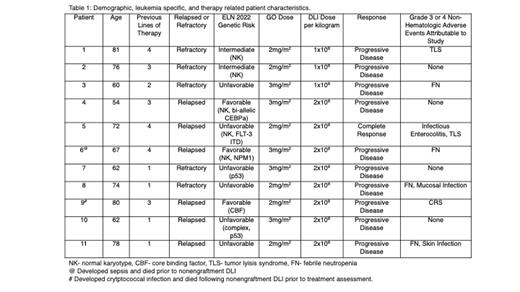Background: Previous studies have shown durable AML patient responses following donor lymphocyte infusions (DLI) in the absence of engraftment in both the frontline and relapsed setting (Dey et al, BJH 2005, Colvin et al, BBMT 2009, Ai et al, Blood 2010). Herein we report results from the completed dose-escalation phase from our trial of fractionated dosing of gemtuzumab ozogamicin (GO) followed by non-engraftment mismatched allogeneic donor cells infusion in patients with relapsed/refractory (R/R) AML. In this trial, instead of engraftment, it is postulated that donor cells serve as a potent immune stimulator.
Study Design and Methods: In this phase I/II study, GO 6-9mg/m 2 total dose was administered as a fractionated 2-3mg/m 2 dose (capped at 4.5mg) on days 1, 4, and 7, followed by infusion of HLA-mismatched (0-3/6 antigens) related donor cells on day 8 [NCT03374332]. The dose-escalation phase 1 cohort used a 3+3 design combining GO with donor leucocyte infusion (DLI) at dose 1-2x10 7 CD3+ cells/kg (Dose Level 1) or 1-2x10 8 CD3+ cells/kg (Dose Level 2). Patients enrolled in the phase II portion were treated at the maximum tolerated dose (MTD) level. Lab correlative studies were drawn pre and post DLI to assess immune effector cells and leukemic blast surface expression as well as cytokine release profiles.
Patients 18 years of age and older with histologically confirmed R/R AML who had recurrence or progression after at least 1 prior standard treatment were eligible. Enrollees must have had no active systemic infections and adequate lung, liver, cardiac, and renal function with an ECOG PS 0-1. Patients in CR or CRi after initial treatment could receive up to 2 additional treatments with GO+DLI.
Results: Eleven patients (7 men and 4 women) were enrolled into the study. The median age was 72 years (54-81 years) and patients had received 1-4 previous lines of treatment. All patients were refractory to hypomethylating agents and venetoclax. No patient was a candidate for allogeneic stem cell transplant at the time of study enrollment. Ten patients received 3/6 and one patient received 1/6 HLA mismatched donor cells from a first- or second-degree relative.
The MTD was determined to be 2x10 8 CD3+ cells/kg. Three patients were enrolled on dose level 1 and eight patients were enrolled on dose level 2. Treatment was well tolerated with minimal Grade 3 or 4 non-hematologic adverse events attributable to the study ( Table 1). One patient at dose level 2 developed septic shock and died prior to DLI while another patient at dose level 2 developed cryptococcal fungemia and died within one week of DLI. No donor experienced a Grade 3 or 4 adverse event.
All patients had fever post DLI that fit criteria for Grade 1 or 2 CRS while one patient developed Grade 3 CR. Two patients with Grade 2 CRS and one patient with Grade 3 CRS received tociluzimab. One patient attained a CR after one cycle of GO+DLI. All other patients had progressive disease. Ultimately the study was stopped early due to futility.
Median IL-6 and IL-8 levels were higher in the first 3 patients at dose level 2 (605.5pg/mL and 218.5 pg/mL) compared to the three patients in dose level 1 (79pg/mL and 57.8 pg/mL) but the difference was not statistically significant. IL-10 levels were significantly higher in dose level 2 than dose level 1(125 vs 14.8 pg/mL, p=0.05)
Conclusions: The MTD of DLI in combination with GO for relapsed/refractory AML patients is 2x10 8 CD3+ cells/kg. Treatment in an older relapsed/refractory population was well tolerated. Patients reliably developed fevers post DLI with Grade1 or 2 CRS. However, there was no evidence that fever development corresponded to a clinical benefit or that the addition of non-engraftment DLI augmented the effect of single agent gemtuzumab. Additional analysis of cytokine release profiles for the remaining patients as well as immune checkpoint inhibition on leukemic blasts for all patients will be presented at the meeting.
Disclosures
Reagan:Pfizer: Research Funding; Rigel: Membership on an entity's Board of Directors or advisory committees.


This feature is available to Subscribers Only
Sign In or Create an Account Close Modal